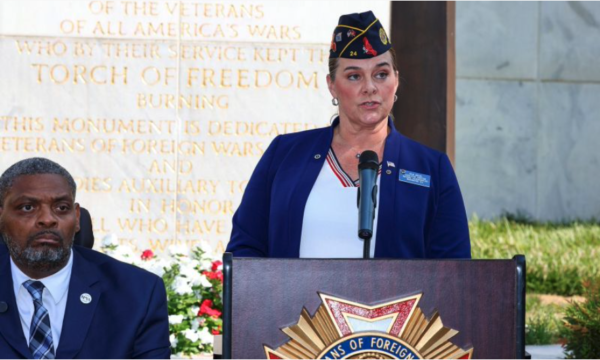
The Legion joined with other VSOs at a press conference in D.C. to call for the immediate passage of supplemental funding legislation. (Photo: VFW)
UPDATE: The House of Representatives has passed an emergency budget bill to address the VA’s shortfall. The bill is awaiting a vote in the Senate, where it is expected to pass before being sent to President Biden’s desk.
Multiple Veterans Service Organizations, VSOs, including The American Legion, gathered in Washington, D.C. on Wednesday to address the VA’s budget shortfall. They urged Congress to pass supplemental funding legislation before the September 20 deadline, which coincides with a continuing resolution expected to prevent a government shutdown.
VA officials revealed the need for an additional $3 billion to cover 2024 and a further $12 billion for the 2025 medical budget, critical to maintaining Veteran outreach, wait times, and staffing levels, as reported by Military.com.
In a press conference, The American Legion, alongside other groups like Veterans of Foreign Wars and Disabled American Veterans, supported legislation proposed by Senator Sherrod Brown and Representative Mike Garcia to address these shortfalls.
“This financial crisis will affect disability compensation, caregiver compensation, community care payouts, everything,” said Julia Mathis, the American Legion’s Legislative Director, stressing the far-reaching impact.
She highlighted the uncertainty that Veterans are already facing as the September 20 deadline looms, pointing out that delays in compensation payments could leave many Veterans and their families financially vulnerable.
The VA’s outreach efforts have been unprecedented, partly driven by new legislation such as the PACT Act, which expanded benefits for Veterans exposed to toxic substances.
“We can’t financially support the next set of Veterans who come into care… it’s not commensurate with the promise that we’ve made to folks who wore the uniform,” stated VA Under Secretary for Health Shereef Elnahal expressing concern over the potential consequences of the funding shortfall.
He warned that without adequate funding, Veterans could face reduced access to care, increased wait times, and understaffing across medical facilities.
The shortfall is further complicated by disagreements in Congress. Republicans, particularly House Veterans Affairs Committee Chairman Mike Bost, have blamed the budget issues on mismanagement, with Bost stating, “The Biden-Harris administration has embarrassed themselves… resulting in a $15 billion shortfall.”
A draft continuing resolution from House Republicans did not include the necessary $12 billion for the VA’s medical budget. Instead, it proposed language allowing the VA to use existing funds to maintain operations. Democrats criticized this as insufficient, with the White House also threatening to veto the proposal.
The VA’s funding gap also affects non-medical benefits, with officials warning that without swift action, benefits payments could be delayed in October. The White House has stressed that failure to secure additional funding could lead to cuts in staffing, reductions in outreach efforts, and delays in services critical to Veterans’ health and well-being.
“The mental stress brought on by these situations could lead some Veterans into depression or hopelessness, even to the brink of suicide,” said Mathis noting the mental health toll these delays could have on Veterans who rely on their compensation.
The American Legion’s programs like the Be the One mission and Buddy Check program aim to support Veterans through such crises, encouraging mental health intervention and community support.
Despite the urgency, House Republicans introduced a draft continuing resolution, CR, that excluded the requested $12 billion for the VA’s medical budget. This has drawn criticism from Democrats, who argue that the GOP’s proposal undermines Veterans’ access to critical healthcare.
As the White House pushes for the inclusion of this funding, the debate continues, with Veterans’ organizations advocating for immediate action to avoid a potential crisis. The American Legion, along with several other Veterans service organizations, sent a letter to Congressional leaders, urging swift action to approve the required funding to prevent any disruptions in benefits or essential healthcare services.












